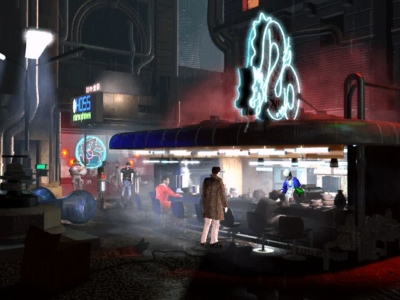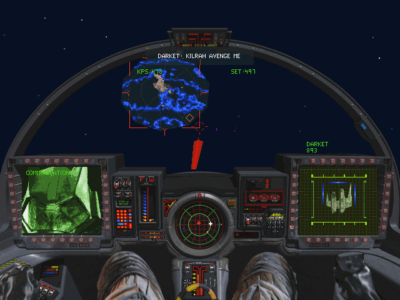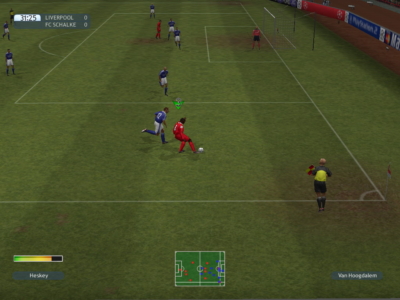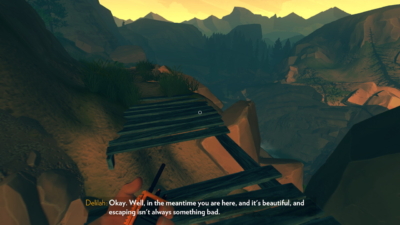For some reason, November 2001 has been retained in my head as the significant month when it comes to the origins of this site: I figured while it probably was not when Stoo put the first incarnation of FFG online, it was at least roughly when my initial ramblings were published.
This is, it turns out, both definitively and verifiably wrong, with even a cursory check of publication dates on the site itself highlighting reviews from much earlier that year. (Goodness knows why I never bothered to check until now). And while I’m certain that Blade Runner was definitely the first game I ever reviewed here, exactly when that piece was first written remains a mystery, due to some early 00s tinkering with the write-up. (The Wayback Machine can retrieve the original, but we didn’t put dates on our reviews back then).
Ah well. Such things probably don’t really matter very much to anyone, except possibly me. And they don’t really matter very much to me, either. But there is a reason why I’m writing this piece now, other than the usual lack of time or organisation: it was part of a semi-deliberate plan, even if the underlying reasons for that plan happened to be completely invalid.
Anyway, whichever way you look at it, A Force for Good has now been online for at least 20 years, and despite our humble status in this quiet corner of the web, it still seems like a significant milestone, worthy of some kind of acknowledgement. We may not have been the most prolific site in terms of reviews over the years, but it’s fair to say that new content has been in fairly regular supply: there have been a few quiet moments, but rarely long periods of complete silence.
We’ve marked previous anniversaries with a combination of attempts at special features and blog posts. Looking back, the 10 year anniversary was the first obvious and significant one to be acknowledged: I wrote When I Played to mark 15 years because, while there was no active talk of winding things up, the thought of reaching 20 at that stage seemed a rather ludicrous and far-fetched notion. But here we are.
Hopefully you’ve noted our series of double-feature reviews: we’ve got a couple more planned, although they may well leak into next year now. So this is where I try and fail to say something interesting and/or profound about the site from a personal perspective (Stoo may well be along at some point to add some thoughts of his own). And, in a break with tradition, I’m going to try and avoid repeating things that have been said on previous occasions. (If it turns out that I have done so, anyway, apologies: I’m getting forgetful in my old age).

If it turns out Blade Runner wasn’t actually my first review then my head will explode. But we’ll never know.
One thing that I probably haven’t really expressed in the past is just how exciting it was in 2001 to write something that would be published online. In those days, coding even a fairly basic site required a certain level of expertise, and was definitely beyond me at the time. Even though Stoo put a fairly self-deprecating note on the front page that compared his skills to that of a primate, I was (and remain) impressed not only by his ability to put everything together in the first place, but also improve the site along the way, both in terms of looks and functionality.
(A proper site history is probably beyond us at this point, but from memory there was significant tinkering with the review and menu appearance and format in the early days, before search options, a content management system, video clips and the pre-Wordpress blog – the FFG journal – all followed later in the 00s).
At that stage, there were definite parallels with the world of physical publishing, in that I had to send my reviews off, plus screenshots, via e-mail, and wait for them to be formatted and published. Around this time, I was also working for the student newspaper at university, which had very similar requirements. And while nothing quite beats having your name in print (no matter how banal the subject matter or insignificant the circulation) I experienced a similar level of excitement from receiving an e-mail from Stoo saying FFG had been updated as I did in picking up a copy of the newly-published university rag.
FFG felt like it existed in a pre-blog world, before non-professional writing and publishing on the web was quite as accessible, mainstream or widespread. As this changed over the years, that special feeling of ‘having a website’ sort of wore off, before blogging itself became seen as outdated and irrelevant in the world of social and video content.
In that time, it would have been unusual for our thoughts and feelings about the site and its intended audience to remain completely constant, and from my point of view there were certainly times where the mind wandered to the possibilities that may exist for promoting FFG more widely, trying to attract a wider audience, and embracing new-fangled media channels.
Occasional dabblings aside, though, things here have rarely strayed too far from the original intent, i.e. writing down a few thoughts about old games in the hope that they may be of interest for like-minded gamers to hazard upon one day. Although FFG now has a blogging platform, a mobile site, and a (limited) social media presence, we remain, for better or worse, a fairly Web 1.0 outfit in most respects. Possibly we’ve circled back to the point where ‘having a website’ – at least in this form – is unusual again. And I quite like that! (Does this mean FFG is itself retro? We’re certainly old enough.)
Plenty has changed around us, of course, although I’m not sure there have been as many significant developments in the world of old PC gaming in the last 10 years of our history as there were in the first 10. As Stoo noted back then, the availability of oldies for purchase on the likes of GOG and the accessibility of tools like DOSBox and ScummVM were massive game-changers, and in my case meant that suspicion of new versions of Windows and hoarding of retired PC towers were less crucial when it came to playing and reviewing oldies.
DOSBox and ScummVM compatibility has only improved since, with the increase in processing power over the years also allowing more demanding games to be run with ease. (I never imagined I’d see the day when you could buy Wing Commander III for a couple of quid, download it in minutes, and have it installed and running in a window on your desktop).
Games designed for Windows 95 and 98 which don’t agree with the modern 64-bit iteration are possibly the next major hurdle to be overcome: although I know some have had success with virtual machines, my own tentative steps into that world have had mixed results. And there’s never quite been a title that I simply had to get working to motivate me in this regard (if you excuse the brief period of madness trying to get to the bottom of why this old football game kept crashing).
A part of me does miss the slightly nerdy hobbyist aspect of fiddling about with old machinery and CDs, although there was certainly an element of spending too much of my time on getting something up and running and not enough on actually playing and enjoying the games back then. A focus on the technical side of things is something that seems to have become increasingly prevalent in retro circles these days, although in fairness this is often in the context of discussing a re-release, retro collection or mini-console which is being sold for money, when in the past the titles in question might have been illicitly downloaded and emulated at no cost to the player.
While we’ve always tried to advocate buying old games when available, I must also admit to an element of wistfulness for the old days of excitedly browsing abandonware sites. Certainly, preserving old games and making them legally accessible is a worthy cause, although whether the motivations of the companies who belatedly cottoned onto the market for such things are quite so pure is open to question. (The recent trend for removing perfectly functional – and affordable – PC games from sale to be replaced with so-called ‘remastered’ versions would suggest not).
My own gaming habits have also changed over the years: from being a relentless tinkerer, playing the first couple of hours of lots of games, to now only really starting those that I intend to finish. For the sake of the site, the development of an ability to focus has been a blessing, and I certainly prefer experiencing, understanding, and (ideally) completing a game to endless fiddling, although I do sometimes wonder if it would really be so bad if I dipped into a few more titles from the backlog to see what they were all about from time to time.
Perhaps some of that early restlessness came from the sense shared by our generation of gamers that it was actually possible to keep up with and across what was happening with all games of all genres at a particular time: a monthly magazine in the 90s/00s would pretty much review everything that was out there, while the playable demos on the cover-mounted CD would give you a taste of what was going on, outside of those titles that you actually bought and played.
Magazines are sadly now a dying breed, but those that are still going these days have no chance of giving a modern gamer such a broad overview of what’s out there, and instead focus on a handful of interesting and/or noteworthy titles. The explosion of indie games, in particular, mean that even the most prolific and well-resourced websites can’t keep up. We’re a long way from the days when the Indie Zone pages of PC Zone would feature a handful of crap-looking arcade shooters.
(Incidentally, the indie scene’s revival of the point and click adventure, and its reimagining of the genre through the short-form first-person narrative format was the most significant development in ‘modern’ gaming that had an impact on me during the past 10 years, to the extent that I lobbied for the occasional step outside the roughly-defined parameters of what we usually cover here for a handful of reviews, as well as establishing a semi-regular discussion series. It’s another unforgiveable retro-crime to add to the list of those perpetrated by FFG over the years, for which I take full responsibility).
But the widely-held notion of 20 years ago that it was perfectly possible (and desirable) to know about all games was, looking back, utterly ridiculous. I was as guilty as anyone else in this regard, and will admit to thinking at various points during FFG’s lifespan that there was a big list of ‘significant’ games that could be ticked off once covered: a journey towards some logical endpoint that would one day be completed. In fact, I distinctly remember once glancing through a longlist of possible future titles for review, not particularly fancying any of them, and wondering if I’d actually written about everything that interested me already.
This thought, most likely the result of treating a fun hobby like a job, was soon dismissed as ludicrous, and ultimately started the train of thought that led to the Vault of Regret and The Big Cardboard Box: not only did I not play all of the games that I actually used to own, I couldn’t even remember what they were.
Clearly, trying to track down and review all these titles would also fall into the category of turning something light-hearted and enjoyable into a grim tick-list of tasks, the completion of which would not, in all likelihood, provide any sense of accomplishment or closure in any case. But the realisation that such a quest would remain a lengthy and time-consuming one despite the many years already spent playing and writing about old games does underline just how much more is still out there waiting to be rediscovered and enjoyed.
And, at the time of writing, my own motivation and capacity to do so remains. Who knows what life has in store, and what may cause that to change? But for the time being, I hereby renew my commitment to offer an ongoing contribution to this slow-moving review site, dedicated to the world of PC gaming between 1990 and 2010 (plus a few outliers).
Thanks very much, as always, for reading.






 Posts
Posts
Happy anniversary, haha!
That means I’ve been reading this site for 10 years… dang. Thanks to you guys for the periodic dusting of my own memories playing several of those reviewed on the site. Looking forward to the next decade!
December 1, 2021 @ 3:13 pm
I don’t come here often, but when I do it feels like visiting a dear old friend that I immediately feel guilty for not having stayed in touch with.
Congrats. Don’t ever change.
December 2, 2021 @ 12:45 am
To the next 20 years!
December 3, 2021 @ 7:08 pm
I was listening to the PC Zone Lives podcast (thanks for the heads-up) and they mentioned the indie revival, well to be precise Steam dropping greenlight requirements, as one of the biggest developments in gaming since the magazine’s death.
Personally I remember hating the fact that it meant the end of being up to date on Everything Out There, the 10 new games each month, of which you could play all the ones in the genres you enjoyed.
Anyway I’m old and enjoy reading simple no fuss websites a great deal. So thanks!
December 5, 2021 @ 10:18 pm
Will we all still be doing this when we’re 60? The games might have to change…
Congratulations on 20 years strong! Please keep writing when you can, it wouldn’t be the same without you two!
December 6, 2021 @ 5:24 am
Hey all, thanks for the good wishes! 20 more years does seem vaguely ridiculous at this point but you never know… perhaps we’ll get good at flight sims in our old age.
December 6, 2021 @ 2:06 pm
Hi Rik and Stoo,
Happy 20th anniversary of your site!
It’s for more than ten years that I read your material with pleasure, which I found through link on JGR!
You are asking if running a website is still prestige. To me, it absolutely is: some years ago, inspired by J Man and you guys, I wanted myself to start a review site with my friend and band-mate, but we went nowhere with that.
Nowadays, with my parenthood, it has become a distant thought, but there are people still writing while growing children (including yourselves, I suppose), so I think it’s feasible, but quite difficult in terms of writing often and constantly – and you have to build your database, after all.
Another problem could be the games themselves: as you pointed out, there are too many, be it abandonware or GOG/Steam releases. I feel that too: amassing titles in library has become painful, because you never know if you’ll have time and will to play them at least once. But focusing on one title at the time, when you can, is indeed a blessing!
Anyway, I wouldn’t say that your site is “retro” itself, because I found many retro-reviewers that are still running their websites and are focused on writing only, so don’t worry and go forth!
I hope to enjoy more of your articles to come, and wish you to continue your journey and your site!
December 7, 2021 @ 12:18 pm
“Games designed for Windows 95 and 98 which don’t agree with the modern 64-bit iteration are possibly the next major hurdle to be overcome”
I *highly* suggest you check out PCem or 86box (the former is more stabilized while the latter is more progressive). They’re more than just a virtual machine since they emulate the actual hardware, such as an Intel Pentium 200mhz or maybe a 3dfx Voodoo Banshee. A decent PC is needed though. For example, my Intel 3.4ghz can only properly emulate up to a 200mhz, if I try anything higher it’s too choppy.
Those 2 programs really re-ignited my interest to the Win9x scene, and if something doesn’t work on my actual Win98 rig, I then turn to those 2 programs.
Cool site btw. Just found it via searching for PC Zone history (been re-reading the mags in order, did the same to CGW), which admittedly there wasn’t much of online.
December 8, 2021 @ 7:46 pm
Thanks for the recommendation, will look into those options next time.
As I mentioned, thus far I don’t think I’ve ever had something that I was really motivated to get working… I once started tinkering with one option or other before I realised it was far too much faff for an old Tiger Woods golf game that didn’t work on XP for some reason.
December 9, 2021 @ 2:40 pm
“Will we all still be doing this when we’re 60?”
Just a couple of months ago, I found myself thinking related things. In my mind calculating how many games I could actually still experience and cover in my remaining lifespan. Being somewhat disheartened by the prospect it won’t be nearly as many as I would have liked to.
December 10, 2021 @ 8:02 pm
“Thanks for the recommendation, will look into those options next time.”
No problem. It’s not as big of a headache as it first seems, and it can be fun once get the hang of it.
BTW, I’ve been working on a Windows 95/98 project myself. A pretty big one. After browsing thru your guys’ website, maybe you’ll take a liking to this image I created. It’s strictly the 1995 to 2001 era:
https://ibb.co/LkTKLC9
December 15, 2021 @ 10:18 pm
Errrrr. The image looks 10x better & is readable once zoomed in. Sorry bout that lol.
December 15, 2021 @ 10:21 pm
Hey, I like that!
Interesting to see a reference to ‘Need for Speed IV’… which must have been Road Challenge/High Stakes? It was the fourth game but not sure it was ever officially called that. Mind you, it’s been a long time since I had it installed…
December 17, 2021 @ 5:23 pm
Yep High Stakes (that’s…..weird you brought that up, out of the 360 games, because I just reinstalled High Stakes last night before I saw your comment…spooky).
But yeah, during development and previews it had “IV” but then the number got dropped. Kinda like the 5th Wing Commander, 2nd Redneck Rampage, 3rd Carmageddon (kept for U.S. release tho), 8th King’s Quest (retroactively added tho), etc. Guess some publishers got spooked by numbers lol.
Decent game tho. They took a few pages out of Sierra’s Viper Racing, while still being close enough to Need for Speed III: Hot Pursuit.
December 19, 2021 @ 12:19 am